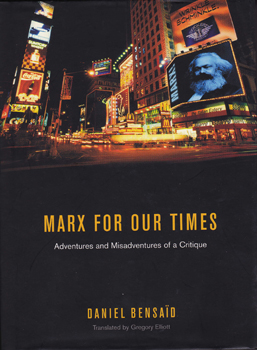
The collapse of Stalinism was good news not only politically, but also intellectually. For with it, a vital critical tradition was released from the impostures of a sclerotic orthodoxy that had annexed the enterprise of Karl Marx, leaving it incapable of interpreting – let alone helping to change – a world dominated by commodity fetishism.
Without denying the contradictory character of Marx’s thought, Daniel Bensaïd sets out to demonstrate, with the aid of Walter Benjamin and Antonio Gramsci, both what it was not and what it was. It was not a philosophy of the end of history, an empirical sociology of classes, or a positive science of economies, positing an inexorable progress towards an ineluctable communism. Instead, Marx’s “critique of political economy” encompassed three great critiques of the scientific and political canons of its age – of historical reason, sociological rationality, and scientific positivism – which render this thinker from the nineteenth century fully relevant to our twenty-first century of global capitalism. Indeed, we find hère a “post-postmodern Marx” able to inhabit a contemporary world replete with contingency, emergency and contradictory temporalities.
Published in France on the eve of the strikes of 1995 that signalled a profound revolt against la pensée unique, Marx for Our Times is an invitation to rediscover our foremost theoretical contemporary, Karl Marx.
“The resuit of a long process of research, this book offers us an analysis of the thought of Marx and of its relevance which should be considered as a new landmark, and which opens up new perspectives and polemics which will no doubt continue to live on for some time.” Le Monde
“Bensaïd fumishes us with a new reading of Marx which both criticizes and surpasses the debates and problematics of the past. A Marxist reading of Marx, in the sense of the eleventh Thesis on Feuerbach: interpreting the world in order to transform it… A reading which is neither apologetic nor conservative.”
La Quinzaine littéraire